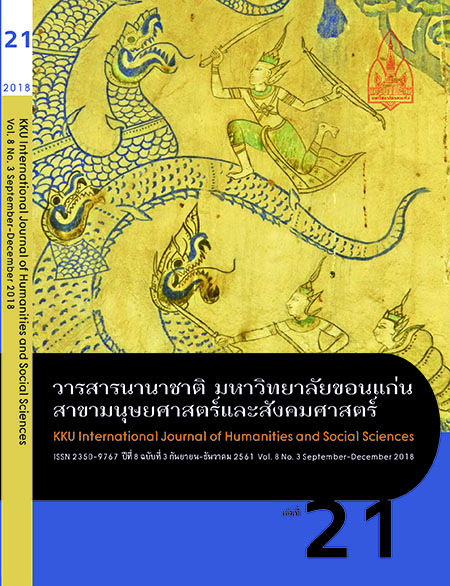Relationship between perceptions of health status, needs, expectations ability for self-care among elderly people dwelling at community in Khet Bang Phlat in Bangkok of Thailand
Main Article Content
Abstract
The study aims to examine the health status, needs, expectations, self-care ability, and correlation among these variables. A stratified sampling technique was used to recruit elderly people 60 years old or over into the study (N = 392). Data collection was carried out by using two questionnaires. The first questionnaire collected information related to general background, basic clinical examination, physical health self-reports and mental health self- reports. The second questionnaire was used in order to gather data in relation to needs, expectations and self-care ability. These two questionnaires had IOC equal to 0.8 and the questionnaire about needs, expectations, and self-care ability were statistically significant to a level of .908, .929, and .925 respectively.
The results revealed that 283 elderly men and women had skin problems; 205 had excessive body mass index (BMI), and 191 had visual impairment. Physical health self-reports showed that 220 had muscle pain, 207 had join pain, and 199 had muscle weakness. Three common physical problems were hypertension (N= 170), hypertension with dyslipidemia and diabetes mellitus (N = 160), and fever (N =17), Data from mental health self-reports showed that 344 participants had normal mental health status. For physical needs assessment, 351 participants required adequate nutrients and hygienic foods, 324 needed to have sufficient sleep, and 310 needed to be healthy. For mental needs assessment, 303 participants needed to have more positive moods and less anger, 267 needed care from their children/relatives, and 252 needed social acceptance. For economic needs assessment, 307 participants needed financial support from income and aging insurance, 287 from children/relatives, and 285 from government/private sectors.
For physical expectations, 297 participants expected to have sufficient rest/sleep, 285 expected healthiness, and 282 expected high a quality surrounding/environment. For mental expectations, 286 participants expected to have a more positive mood, 256 expected care from their children/relatives, and 237 expected acceptance from society. For economic expectations, 272 expected to receive support from children/relatives, 242 expected to be less independent, and 245 expected to be part of their families/societies.
For physical self-care ability, 218 participants had the ability to have sufficient rest/sleep, 196 had health, and 190 were able to live in sanitary conditions. For mental self-care ability, 240 participants were able to have a good mood and avoid anger, 218 were accepted by their children/relatives, and 213 achieved acceptance from neighbors and societies. For economic self-care ability, 250 participants reported that they received acceptance from children/relatives, 208 received financial support from income and ageing insurance from government, and 203 of those were active members of their families.
Findings of the study showed that there was no statistically significant difference between gender and health status. Variables of needs, expectation, and self-care ability, which included physical, mental, and economic status, were statistically significant correlating at the level of .424, .536 and .598 respectively (p-value <.01).
Article Details
References
References
Department of Older Persons DOP. (2014). The report of the situation of the elderly in Thai 2013. Worked
at Social M society. (in Thai)
Viroshrat, V., et al. (2011), Studied the health and risk behavior of elderly people participating in the
health promoting project. Thai Journal of Nursing Council Vol. 26 Special Issue January-March
(in Thai)
Kaewpitoon, S., and Kaewpitoon, N. (2011). Nutritional status and associated factors with among older
adults in Surin Provinc. Suranaree University. (in Thai)
Klin-ngam, W., et al. (2012). The Participation of Communities to Improve the Quality of Life in the Aging
Population in Phetchaburi Province. Vol 14 (2) July - December 2012. (in Thai)
Petchprapai , N. (2015). A Survey of Health Status among the Older Adults who Live in Muang District
Nakhonratchasima Province. Suranaree Journal. Vol 33 (1) January – February 2015. (in Thai)
Wongpanarak N., et al. (2013). Mental health status, hope, and self-care behaviors regarding mental
health of elderly in Maha Sarakham municipality. KKU Journal for Public Health Research Vol 6 (1)
January – March 2013. (in Thai)
Yoosabay, N. (2012). Needs for social welfare services among senior citizens in sisa chorakhe noi
Subdistrict administrative organization, amphur bang sao thong, samut prakan province. Burapa
University. (in Thai)
Taifampoon, T. (2015). Attitudes and Expectations towards Living and Brand Consumption by Consumers
Aged 40+ in Bangkok. Journal of Business Communication Arts. Vol 9 (1) January – June 2015.
(in Thai)
Yodsud, S. (2013). Examination of mental salf-care and disease preventive behavior in elderly.
Srinakarinwirot University. (in Thai)
Rodsaweang, S. (2015). Factors related to dental care behaviors among the elderly in Thungthong
sub-distric, Nongbua distric,Nakhonsawan province. Naresuan University. (in Thai)
Chitsopakul, N. (2014). Factor relating to health promotion behaviors among elderly people living in
Moo 6 community, Tumbon Bung San, AmphoeOnkkarak, NkornNyok. Pathumthani University
academic journal. Vol 6 September – December 2014. (in Thai)
A.H. Maslow. (1943). A Theory of Human Motivation. Psychological Review 50 (4) P. 370-96.
Vroom VH. (1964). Work and motivation. San Francisco: Jossey-Bass; 1964.
Volkert J, Schulz H, Härter M, Wlodarczyk O, Andreas S. (2013). The prevalence of mental disorders in
older people in Western countries - a meta-analysis. Ageing Res Rev. 2013 Jan;12 (1) :339-53.
doi: 10.1016/j.arr.2012.09.004. Epub 2012 Sep 19.


